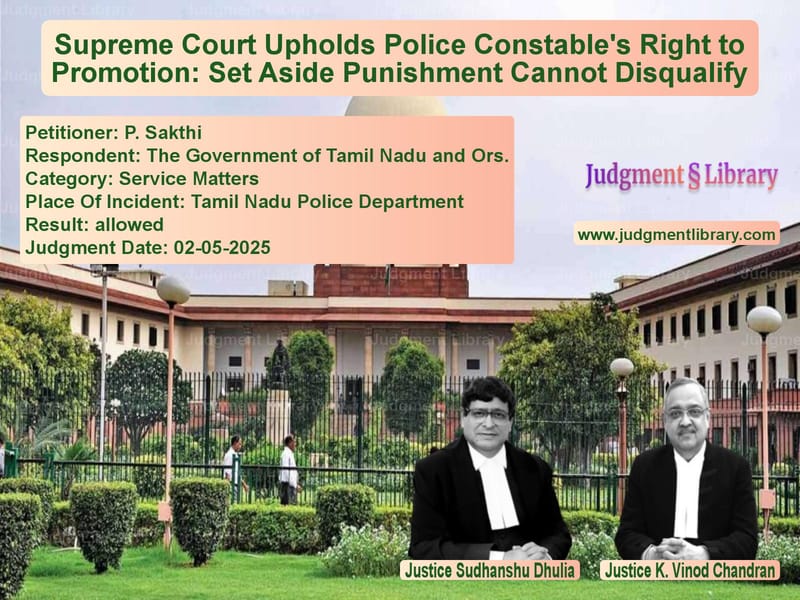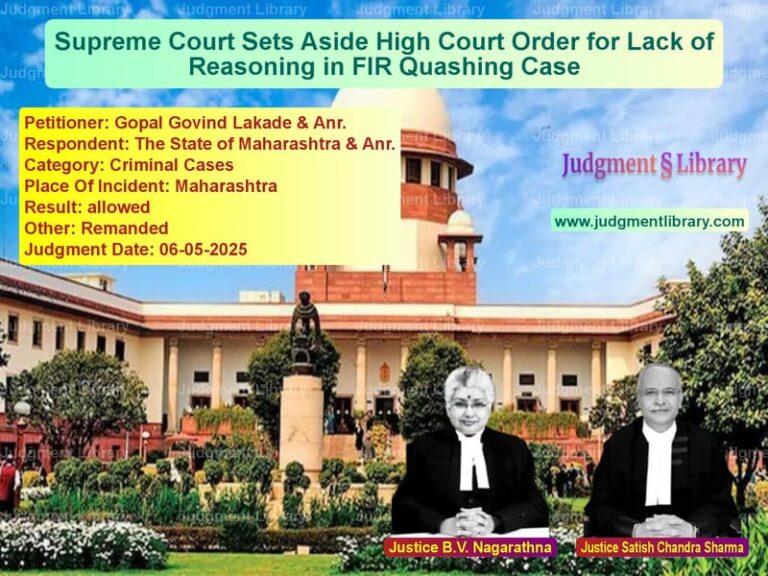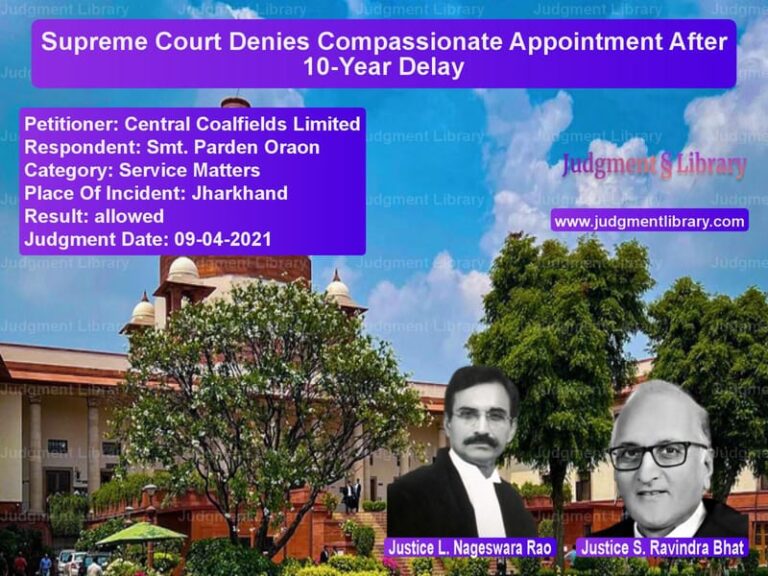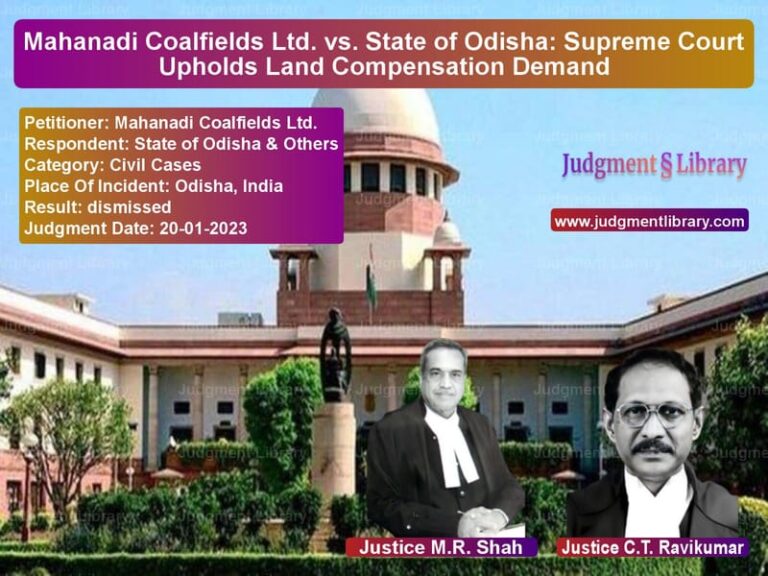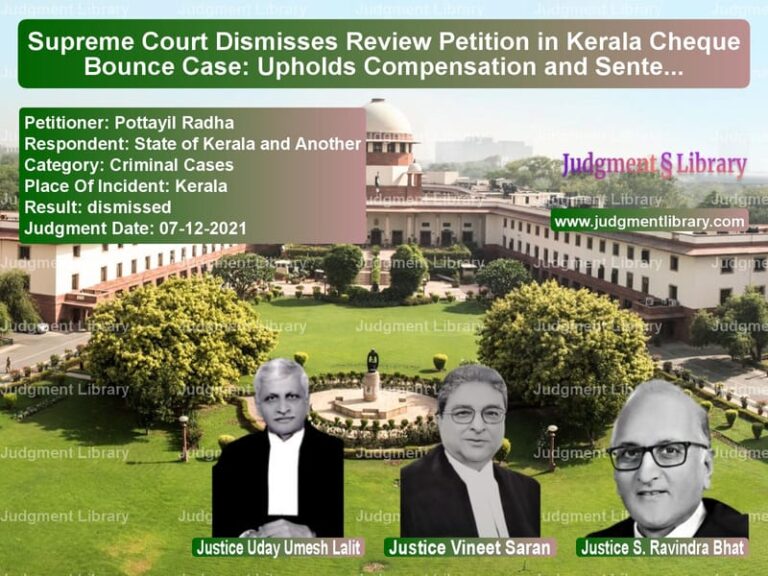Supreme Court Upholds Police Constable’s Right to Promotion: Set Aside Punishment Cannot Disqualify
In a significant judgment that reinforces the rights of government employees, the Supreme Court of India has ruled that a police constable cannot be denied promotion based on a punishment that was subsequently set aside by competent authorities. The case of P. Sakthi, a Police Constable in the Tamil Nadu Police Department, highlights the importance of ensuring that employees are not perpetually penalized for disciplinary matters that have been legally overturned, and establishes that the right to be considered for promotion is a fundamental service right that must be protected.
The appellant, P. Sakthi, was initially appointed as a Police Constable on March 1, 2002, and had served diligently for years, becoming eligible for consideration for promotion to the post of Sub Inspector of Police by 2019. However, when a notification was issued for considering eligible constables for in-service promotion in the 20% departmental quota, his application was rejected based on a disciplinary incident from 2005 that had already been set aside in 2009. This rejection sparked a legal battle that would ultimately reach the highest court of the land, raising important questions about the lasting effects of disciplinary actions and the rights of employees to fair consideration for career advancement.
The Supreme Court’s judgment, delivered by Justices Sudhanshu Dhulia and K. Vinod Chandran, not only provides relief to the individual appellant but also sets an important precedent for thousands of government employees across India who may face similar situations where past disciplinary actions, even those that have been legally overturned, continue to haunt their career progression.
Read also: https://judgmentlibrary.com/supreme-court-upholds-teachers-appointment-in-caste-category-dispute/
The Background of the Case
The case originated from an incident that occurred years before the promotion consideration in question. The appellant had been proceeded against both departmentally and under criminal law for allegedly having beaten up a colleague when they were posted at a check post. As the Court noted, “After duty, some dispute arose between them and there was a brawl in which the other constable was injured. This led to a criminal case being lodged in which he was arrested but later acquitted.”
The departmental proceedings, however, had resulted in a finding of guilt with resultant punishment imposed. The specific punishment was “postponement of next increment for one year without cumulative effect, imposed on 09.05.2005.” This punishment, while seemingly minor, would become the central point of contention in his promotion case more than a decade later.
Crucially, this punishment was not allowed to stand. As the Court emphasized, “The departmental proceedings though entered in the finding of guilt with resultant punishment imposed, the same was set aside in 2009 by the Government as is evidenced from Annexure P/4.” This setting aside of the punishment by the Government in 2009 should have cleared the appellant’s service record, but unfortunately, it continued to affect his career prospects years later.
The Promotion Denial and Legal Challenge
In 2019, when the appellant applied for promotion to the post of Sub Inspector of Police under the 20% departmental quota, he was denied consideration through Annexure P/8 dated April 13, 2019. The Superintendent of Police cited the 2005 punishment as the reason for disqualification, despite it having been set aside a decade earlier.
The Court noted that while “the recruitment rules provided for disentitling an in-service candidate, if they did not have a clean record of service without any punishment other than minor punishment of black mark, reprimand and/or censure,” this disqualification could not logically apply to a punishment that no longer existed in the eyes of the law.
The Court made a crucial observation about the legal status of the punishment: “However, the appellant’s punishment was interfered with and set aside by Annexure P/4 as early as 27.11.2009. The criminal case lodged against him on the similar set of facts had also ended in his acquittal.” This double vindication – both the departmental punishment being set aside and the criminal case ending in acquittal – made the continued use of the incident for disqualification purposes particularly unjust.
The appellant, recognizing the injustice of being penalized for a punishment that had been legally nullified, approached the judiciary for relief. The writ petition was filed in 2019, the same year he was denied promotion consideration, beginning a legal journey that would ultimately vindicate his position.
The Supreme Court’s Reasoning and Landmark Observations
The Supreme Court’s analysis of the case was both legally sound and grounded in principles of natural justice. The Court expressed clear disapproval of the authorities’ decision to deny promotion consideration based on a punishment that had been set aside, stating unequivocally: “In such circumstances, the appellant could not have been disentitled from a consideration in the year 2019.”
The Court recognized the fundamental unfairness of allowing a legally nullified punishment to continue affecting an employee’s career prospects years after it had been overturned. This approach would essentially render the setting aside of the punishment meaningless, creating a situation where employees could never fully clear their records even when disciplinary actions were found to be unjust or improperly imposed.
One of the most significant aspects of the judgment is the Court’s articulation of the right to promotion consideration. The Court affirmed a well-established principle of service jurisprudence: “It is trite that the employee has no right to be promoted but has a right to be considered, when selections for promotions are carried out, unless disqualified; which right has been impinged, unjustly, in the above case.”
This distinction between the right to promotion and the right to consideration for promotion is crucial in understanding service law. While employees cannot demand promotion as a matter of right, they absolutely have the right to fair consideration when promotion exercises are conducted, unless they are legitimately disqualified under the rules. In this case, the Court found that the disqualification was illegitimate since it was based on a punishment that no longer had legal existence.
The Comprehensive Relief Granted
Understanding the practical difficulties that often arise in such cases, particularly the issue of employees becoming overaged for promotion during prolonged legal battles, the Supreme Court granted comprehensive relief that addressed both the immediate injustice and its consequences.
The Court directed that “the appellant must be considered for promotion, dehors any disentitlement due to his having become overaged.” This Latin term “dehors” means “outside of” or “without reference to,” indicating that the consideration should proceed without regard to the age barrier that may have arisen due to the delay caused by the unlawful denial of consideration.
Furthermore, the Court specified that “The consideration will be made and if found eligible, he shall be promoted from 2019 and consequential benefits also shall be paid to him.” This aspect of the order is particularly significant as it provides not just prospective relief but recognizes the losses suffered by the appellant due to the unlawful denial.
The Court justified the grant of retrospective benefits from 2019 by noting that “it was not his fault that the authority denied his consideration for promotion based on a punishment which had already been set aside.” This approach ensures that employees are not financially penalized for delays caused by administrative errors or unlawful actions of the authorities.
Broader Implications for Service Jurisprudence
This judgment has significant implications for service law across India, particularly in how disciplinary records are treated in promotion matters. The Supreme Court has firmly established that once a punishment is set aside by competent authority, it ceases to exist for all practical purposes, including promotion considerations.
The ruling prevents authorities from maintaining “shadow records” or informally considering disciplinary matters that have been formally expunged or set aside. This is crucial for ensuring that employees who have been vindicated in disciplinary proceedings can truly move forward in their careers without the stigma of past allegations.
Additionally, the judgment reinforces the principle that promotion rules must be applied reasonably and in accordance with legal realities. Disqualifying an employee based on a punishment that no longer exists is not just unreasonable but legally impermissible.
The Court’s approach also acknowledges the practical realities of government service, where promotion opportunities may be limited and delays in consideration can have permanent career consequences. By protecting the appellant from becoming overaged for promotion due to the unlawful denial, the Court ensures that technicalities do not defeat substantive justice.
Conclusion: A Victory for Fairness in Administration
The Supreme Court’s judgment in P. Sakthi’s case represents an important reinforcement of constitutional values in administration. By upholding the appellant’s right to be considered for promotion without the burden of a set-aside punishment, the Court has affirmed that government employment must be governed by principles of fairness, reasonableness, and respect for legal processes.
The judgment serves as a reminder to all administrative authorities that their decisions must be based on current legal realities rather than historical records that have been legally nullified. It also reinforces the judiciary’s role in protecting employees from arbitrary or unreasonable administrative actions that affect their career prospects.
For P. Sakthi and countless other government employees across India, this judgment provides assurance that their career progression will not be permanently marred by disciplinary matters that have been properly addressed and resolved through legal channels. It represents a significant step toward ensuring that the public service is governed by principles of justice and fairness, where employees are evaluated based on their current merits and qualifications rather than past issues that have been legally resolved.
The Supreme Court’s clear and principled stance in this case will undoubtedly influence how promotion matters are handled across various government services, ensuring that the rights of employees are protected while maintaining the integrity of administrative processes.
Petitioner Name: P. Sakthi.Respondent Name: The Government of Tamil Nadu and Ors..Judgment By: Justice Sudhanshu Dhulia, Justice K. Vinod Chandran.Place Of Incident: Tamil Nadu Police Department.Judgment Date: 02-05-2025.Result: allowed.
Don’t miss out on the full details! Download the complete judgment in PDF format below and gain valuable insights instantly!
Download Judgment: p.-sakthi-vs-the-government-of-ta-supreme-court-of-india-judgment-dated-02-05-2025.pdf
Directly Download Judgment: Directly download this Judgment
See all petitions in Promotion Cases
See all petitions in Employment Disputes
See all petitions in Disciplinary Proceedings
See all petitions in Public Sector Employees
See all petitions in Termination Cases
See all petitions in Judgment by Sudhanshu Dhulia
See all petitions in Judgment by K. Vinod Chandran
See all petitions in allowed
See all petitions in supreme court of India judgments May 2025
See all petitions in 2025 judgments
See all posts in Service Matters Category
See all allowed petitions in Service Matters Category
See all Dismissed petitions in Service Matters Category
See all partially allowed petitions in Service Matters Category

